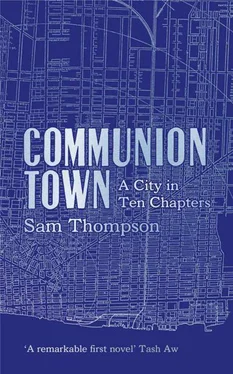I sat down to hear what he was going to say. I remember how the kitchen counter’s light lined the edge of his face, showing the softness of his jaw.
In telling over again the story he told me, I can’t pretend to have the truth of it. I don’t know how he would really have acted with the others, or how they would have been towards him. Maybe, with them, he wasn’t the person I took him for. I can’t feel the texture of his experience, whether he was the darling of the group or a diffident novice, whether he was unsure of his footing or eager to please or barely interested at all, whether he had doubts about what they were doing. Or was the whole experience something different again, something I can’t begin to formulate? I can try and recount what he told me, but even that won’t come clear: it’ll change as I go, shifting out of true, because there’s never a way back to the telling before. We build ourselves into a concentric nest, each shell smaller, each opaquing the last. I can’t tell you what took place, I can only tell the story. So.
Every pleasure palls. In a short time Stephen had learnt to drink deep of experimental delights that would have frightened most of us if we understood them, but the richer the meal, the sooner the appetite wanes, and the epicurean longs for ever more esoteric flavours. He never saw himself as a sybarite; he thought of his explorations as light-hearted, even a kind of joke. But anyone can drift away from themselves when nothing is forbidden. Before he realised it the mask wouldn’t come off: he was corrupt with luxury, famished with feasting. The society knew how to watch for its moment. His mind and body were precise instruments for their own indulgence, but his imagination was sickly with exhaustion. He had fallen into the lassitude of one who has gone too far in the secret regions of experience, achieved too much in the sphere of private ambitions; now the tawdriness of the world was making him ill. His exquisite appetites troubled him more than ever but there was nothing, it seemed, that could answer any more to his needs. He was bored.
He had never wanted to despair. Quite the reverse. He had come to long above all for the gleam in other eyes which said: together we are about to try what would appal the ordinary world; we might even, who knows, startle ourselves. In everything he had done, it now seemed to him, all he had really wanted was that glimmer of unspoken agreement. Even in the gravest acts, there had been something unspoilt about what they did. They had been finding their way back to the green heart of the hedge maze where everything tended to the condition of innocence and the deepest depravity revealed itself as happy mischief. This search, he had come melancholically to accept, was the project of his life, but he feared he’d never again find that bad, blameless joy.
And then they came to him. Later, he would ask himself whether they had been guiding him from the beginning. I imagine it was those twins who made the proposition, coiling themselves one on either side and mentioning casually that there was something else he might find amusing. Something he would not have seen before. Not the kind of experience, he must understand, that would suit more ordinary tastes, and not the kind that it would be desirable for anyone else to know about, but one which some of the more open-minded experimentalists had found diverting. This was how they framed it. They felt they were libertines. If Mephistopheles had come to offer them the world, they would have curled their lips and continued their conversation, or that was the impression they were at pains to convey. Stephen doubted their notions but he credited their sense of style, and he could not turn down the chance of relieving his ennui.
There was a — well, it was a kind of private club, they told him. A society, dedicated to investigating certain potentials, shall we say, certain possibilities usually overlooked; investigating, and, naturally, delectating. Its experiments had been under way for a number of centuries, carried forward with ever more refinement by a handful of like-minded individuals in each generation. From their arch suggestions, it was difficult to work out exactly what they were offering. But it would have been unseemly to press for details, and what difference did it make, for wasn’t he capable of anything and desirous of every strange flavour the world could drop on his tongue?
Gradually he saw what, in their elaborately figurative way, they were hinting at. As it began to take on a shape, his instinct was to laugh: one of those soft, unassenting laughs, to dismiss the fun they were making of him. After teasing their story together by insinuation and omission, they left. He shook his head at the waste of his time, but the idea lingered and deepened, its impossibilities taking on subtlety and shading, so that he could not quite expel it. When we want, we give credence to unlikely tales.
And so Stephen was inducted. He travelled across the city at a specified hour of the night to an address far from his usual haunts, all the way out in Moebius Wall. He watched dubiously as the low streets of Glory Part and Three Liberties crawled past the taxi window; when he arrived he thought the driver must have mistaken the address. The house, a large suburban villa standing on a corner, was to all appearances derelict, surrounded by ramparts of weed and bramble, half-throttled by ivy and propped up on one side by scaffolding. A painted wooden board hung from the railings, warning that the building was unsafe. To Stephen the house appeared not only run-down but incomplete, as though it had fallen into long neglect before it had been finished. The night sky showed through the holes of the upper windows.
The iron gate, which was taller than he was and had layers of green paint cracking off like dead skin, had rusted into place on its hinges, half-open. He edged his way around it and pushed through the overgrowth. The house had no front door, only an aperture into which tendrils of ivy had wrapped themselves to reach along the ceiling. The hallway was defined by unhealthy orange light spilling through the house from the street behind.
Here it becomes difficult to keep hold of what happened to Stephen. What can I say that will bring us any closer to his experience in that house, that experience we are never going to grasp, but of which we can say that it was something, that something happened and he tried later to pass it on? It was the end of his association with the twins and their set. They avoided him after that night, evidently feeling he had let himself down rather badly. Perhaps he was not quite the right sort of person after all. His connections with that upper world seemed to go dead, but it made no difference to him now.
Stephen sat hollow-faced in my kitchen, his gaze flickering continually into the darkness of the living room. He asked for more coffee, emptied the fresh cup without waiting for it to cool and tried again to tell me. It was nothing, what had happened to him in that room, he said. It was all a fraud, a prank, that was obvious, but for some reason he couldn’t seem to shake off the effects.
Something had been waiting for him in the derelict house. He didn’t want to describe it, but it had been waiting in the front room, as dusty and motionless as if it had been standing there as long as the house itself. He might have mistaken it for some peculiar item of furniture except that it turned its head and stepped forward to greet him: it was very glad that he had come. It began to tell him a story. A minute later he was clawing himself away through syrupy space with his feet sliding on the boards as in a slow nightmare, and stumbling out into the streets of Moebius Wall feeling its fingernails catch on his sleeve.
Since that night he’d had no peace. It had taken him weeks to admit it to himself, but there was no doubt that it was following him. He saw it everywhere. It would be sitting along from him in the metro carriage, or would pass him on the November Bridge; or, when he paused by a flower stall on Vere Street, one of the customers would turn to him, and he would have to flee before it could open its mouth. When he walked home late he would hear the dragging footsteps behind him, drawing closer if he slackened his pace, never falling away.
Читать дальше
Конец ознакомительного отрывка
Купить книгу












